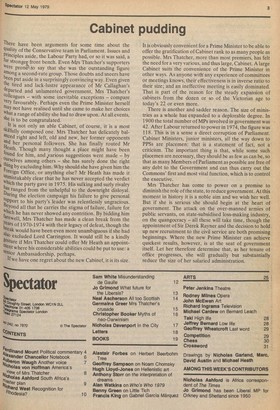Cabinet pudding
There have been arguments for some time about the quality of the Conservative team in Parliament. Issues and Principles aside, the Labour Party had, or so it was said, a far strong% front bench. Even 'Mrs Thatcher's supporters were prone. .to say that she was the outstanding figure among a second-rate group. Those doubts and sneers have been put aside in a surprisingly convincing way. Even given the tired and lack-lustre appearance of Mr Callaghan's departed and unlamented government, Mrs Thatcher's Colleagues — with some inevitable exceptions — compare very favourably. Perhaps even the Prime Minister herself may not have realised until she came to make her choices What a range of ability she had to draw upon. At all events, She is to be congratulated. It is not only an able Cabinet, of course, it is a most skiltii composed one. Mrs Thatcher has delicately balanced right and left, old and new, her former opponents and her personal followers. She has finally routed Mr eath. Though many thought a place might have been lound for him, and ,various suggestions were made — by ourselves among others — she has surely done the right 1,11Ing by excluding him. Why should she have given him the °reign Office, or anything else? Mr Heath has made it unmistakably clear that he has never accepted the verdict which the party gave in 1975. His sulking and surly rivalry jiS ranged from the unhelpful to the downright disloyal. utiring the election campaign his failure to give personal shuPport to his party's leader was relentlessly ungracious. *eYond all that he carries the stigma of failure, failure for yhich he has never showed any contrition. By bidding him farewell, Mrs Thatcher has made a clean break from the ,tears of 1970-1974 with their legacy of defeat, though the teak would have been even more unambiguous if she had also excluded Lord Carrington. It would still be a kindly gesture if Mrs Thatcher could offer Mr Heath an appointment where his considerable abilities could be put to use: a senior Ambassadorship, perhaps. If we have one regret about the new Cabinet, it is its size. It is obviously convenient for a Prime Minister to be able to offer the gratification of Cabinet rank to as many people as possible. Mrs Thatcher, more than most premiers, has felt the need for a very various, and thus large, Cabinet. A large Cabinet suits the convenience of the Prime Minister in other ways. As anyone with' any experience of committees or meetings knows, their effectiveness is in inverse ratio to their size; and an ineffective meeting is easily dominated. That is part of the reason for the steady expansion of cabinets from the dozen or so of the Victorian age to today's 22 or even more.
There is another and sadder reason. The size of ministries as a whole has expanded to a deplorable degree. In 1900 the total number of MPs involved in government was 42. After Labour returned to power in 1974, the figure was 118. This is in a sense a direct corruption of Parliament.
Cabinet Ministers, junior ministers, all the way down to PPSs are placemen: that is a statement of fact, not a criticism. The important thing is that, while some such placemen are necessary, they should be as few as can be, so that as many Members of Parliament as possible are free of any debt to the Government and can thus carry out the Commons' first and most vital function, which is to control the executive.
Mrs Thatcher has come to power on a promise to diminish the role of the state, to reduce government. At this moment in history it is a noble aim and we wish her well. But if she is serious she should begin at the heart of government. The attack on the over-manned armies of public servants, on state-subsidised loss-making industry, on the quangocracy — all these will take time, though the appointment of Sir Derek Rayner and the decision to hold up new recruitment to the civil service are both promising beginnings. Where the new Prime Minister can achieve quickest results, however, is at the seat of government itself. Let her therefore determine that, as her tenure of office progresses, she will gradually but substantially reduce the size of her salaried administration.


































 Previous page
Previous page